- Home
- Philip Roth
The Breast Page 2
The Breast Read online
Page 2
“What is it?” asked Dr. Gordon. “What are you saying, David?”
The nurse began to rub in the oil. I could feel each one of her fingers kneading that face no longer a face. Then something began to make me tingle, something that I soon realized was only the soft palm of her hand slowly moving in caressing circles on that faceless face. My whole being was seething with that exquisite sense of imminence that precedes a perfect ejaculation. “Oh, my God, this is so wonderful.” And I began to sob so uncontrollably that I had to be put back to sleep.
Shortly thereafter, Dr. Gordon came with Dr. Klinger, who for five years had been my psychoanalyst, and they told me what it is I have become.
I was washed gently but thoroughly every morning and then smeared with oil and massaged. After I heard the truth about myself—after learning that I live now in a hammock, my nipple at one end, my rounded, bellied underside at the other, and with two velvet harnesses holding my bulk in place—it was several months before I could take even the remotest pleasure in these morning ablutions. And even then it was not until Dr. Gordon consented to leave me alone in the room with the nurse that I was again able to surrender wholly to Miss Clark’s ministering fingers. But when I did, the palpations were almost more than could be borne, deliciously “almost”—a frenzy akin to what I had experienced in those final weeks of lovemaking with Claire, but even more extreme, it seemed, coming to me in my state of utter helplessness, and out of nothingness, and from this source dedicated solely to kindling my excitement. When the session was over and Miss Clark had retired from my room with her basin of warm water and the vials of oil (I imagined colored vials), my hammock would sway comfortingly to and fro, until at last my heaving stopped, my nipple softened, and I slept the sleep of the sated.
I say the doctor consented to leave us alone in the room. But how do I know anyone has ever left me alone, or that this is even a room? Dr. Gordon assures me that I am under no more surveillance than any other difficult case—I am not on display in a medical amphitheater, am not being exposed to closed-circuit television … but what’s to prevent him from lying? I doubt that in the midst of this calamity anybody is watching out for my civil liberties. That would be laughable. And why do I even care if I am not alone when I think I am? If I am under a soundproof glass dome on a platform in the middle of Madison Square Garden, if I am on display in Macy’s window—what’s the difference to me? Wherever they have put me, however many may be looking in at me, I am really quite as alone as anyone could ever wish to be. Best to stop thinking about my “dignity,” regardless of all it meant to me when I was a professor of literature, a lover, a son, a friend, a neighbor, a customer, a client, and a citizen. If ever there was a time to forget about propriety, decorum, and personal pride, this is it. But as these are matters intimately connected to my idea of sanity and to my self-esteem, I am, in fact, troubled now as I wasn’t at all in my former life, where the style of social constraint practiced by the educated classes came quite easily to me, and provided real satisfaction. Now the thought that my morning sessions with Miss Clark are being carried live on intra-hospital TV, that my delirious writhings are being observed by dozens of scientists assembled in the gallery overhead … well, that is sometimes almost as unbearable as the rest of it. Nonetheless, when Dr. Gordon assures me that my “privacy” is being respected, I no longer contradict him. I say instead, “Thank you for that,” and in this way I am able at least to pretend to them that I think I am alone even if I’m not.
You see, it is not a matter of doing what is right or seemly; I can assure you that I am not concerned with the etiquette of being a breast. Rather, it is doing what I must, to continue to be me. For if not me, who? Or what? Either I continue to be myself or I go mad—and then I die. And it seems I don’t want to die. A surprise to me too, but there it is. I don’t foresee a miracle either, some sort of retaliatory raid by my anti-mammogenic hormones, if such there be (and God alone knows if there are in someone made like This), that will undo the damage. I suspect it’s a little late for that, and so it is not with this hope springing eternally in the human breast that the human breast continues to want to be. Human I insist I am, but not that human. Nor do I believe the worst is over. I have the feeling that the worst is yet to come. No, it is simply that having been terrified of death since the age of two, I have become entrenched in my hatred of it, have taken a personal stand against death from which I seem unable to retreat because of This. Horrible indeed This is; but on the other hand, I have been wanting not to die for so long now, I just can’t stop doing it overnight. I need time.
That I have not died is, as you can imagine, of great interest to medical science. That miracle continues to be studied by microbiologists, physiologists, and biochemists working here in the hospital and, I am told, in medical institutions around the country. They are trying to figure out what makes me still tick. Dr. Klinger thinks that no matter how they put the puzzle together, in the end it could all come down to those old pulpit bromides, “strength of character” and “the will to live.” And who am I not to concur in such a heroic estimate of myself?
“It appears then that my analysis has ‘taken,’” I tell Dr. Klinger; “a tribute to you, sir.” He laughs. “You were always stronger than you thought.” “I would as soon never have had to find out. And besides it’s not so. I can’t live like this any longer.” “Yet you have, you do.” “I do but I can’t. I was never strong. Only determined. One foot in front of the other. Good grades in all subjects. It goes back to handing homework in on time and carrying off the prizes. Dr. Klinger, it’s hideous in here. I want to quit, I want to go crazy, to go spinning off, ranting and wild, only I can’t. I sob. I scream. I touch bottom. I lie there on that bottom! But then I come around. I make my mordant little jokes. I listen to the radio. I listen to the phonograph. I think about what we’ve said. I restrain my rage and I restrain my misery—and I wait for your next visit. But this is madness, my coming around. To be putting one foot in front of the other is madness—especially as I have no feet! This ghastly thing has happened, and I listen to the six o’clock news! This incredible catastrophe, and I listen to the weather report!” No, no, says Dr. Klinger: strength of character, the will to live.
I tell him that I want to go mad, he tells me that it’s impossible: beyond me, beneath me. It took This for me to find that I am a citadel of sanity.
So—I may pretend otherwise, but I know they are studying me, watching as they would from a glass-bottomed boat the private life of a porpoise or a manatee. I think of these aquatic mammals because of the overall resemblance I now bear to them in size and shape, and because the porpoise in particular is said to be an intelligent, perhaps even rational, creature. Porpoise with a Ph.D. Associate Porpoise Kepesh. Really, it is the silliness, the triviality, the meaninglessness of life that one misses most in a life like this. For aside from the monstrous, ludicrous fact of me, there is the intellectual responsibility that I seem to have developed to this preposterous misfortune. WHAT DOES IT MEAN? HOW COULD IT HAVE HAPPENED? IN THE ENTIRE HISTORY OF THE HUMAN RACE, WHY PROFESSOR KEPESH? Yes, it is clever of Dr. Klinger to keep to what is ordinary and familiar, to drone on about strength of character and the will to live. Better these banalities than the grandiose or the apocalyptic; for citadel of sanity though I may be, there is only so much that even I can take.
AS FAR AS I KNOW, my only visitors other than the scientists, the doctors, and the hospital staff, have been Claire, my father, and Arthur Schonbrunn, formerly my department chairman and now the Dean of Arts and Sciences. My father’s behavior has been staggering. I don’t know how to account for it, except to say that I simply never knew the man. Nobody knew the man. Aggressive, cunning, at his work tyrannical—with us, the little family, innocent, protective, tender, and deeply in love. But this self-possession face to face with horror? Who would have expected it from the owner of a second-class South Fallsburg hotel? A short-order cook to begin with, he rose eventually to be the innkeeper himself; reti
red now, he “kills time” answering the phone mornings at his brother’s booming catering service in Bayside. Once a week he comes to visit and, seated in a chair that is drawn up beside my nipple, tells me all the news about our former guests. Remember Abrams the milliner? Cohen the chiropodist? Remember Rosenheim with the card tricks and the Cadillac? Yes, yes, I think so. Well, this one is near death, this one has moved, this one’s son has gone and married an Egyptian. “How do you like that?” he says; “I didn’t even know they would allow that over there.” It is an awesome performance. Only is it performance? Is he the world’s most brilliant actor, or just a simpleton, or just completely numb? Or has he no choice other than to go on being himself? But doesn’t he get what has happened? Doesn’t the man understand that some things are more unusual even than a Jew marrying an Egyptian?
One hour, and then he leaves for home—without kissing me. Something new for my father, leaving without that kiss. And that is when I realize he is no simpleton. It is a performance—and my father is a great and brave and noble man.
And my excitable mother? Mercifully for her she is dead; if she weren’t, this would have killed her. Or am I wrong about her too? She put up with alcoholic bakers and homicidal salad men and bus boys who still wet the bed—so who knows, maybe she could have put up with me too. Beasts, she called them, barnyard animals, but always she went back to the kettles, back to the cleanser and the mops and the linens, despite the angst she endured from Memorial Day weekend to Yom Kippur because of the radical imperfection of our help. Isn’t it from my mother that I learned determination to begin with? Isn’t it from her example that I learned how one goes on from summer to winter to summer again, in spite of everything? So, still more banality: I am able to bear being a mammary gland because of my upbringing in a typically crisis-ridden Catskill hotel.
Claire, whose equanimity has from the first been such a tonic to me, a soothing antidote to the impulsiveness of my former wife, and I suppose even to my mother’s palpitations and all the hotel-kitchen crises—Claire, oddly, was not nearly so good as my father at quelling her anguish right off. What was astonishing wasn’t her tears, however, but the weight of her head on my midsection when she broke down and began to sob. Her face on this flesh? How can she touch me? I had been expecting never to be handled again by anyone other than the medical staff. I thought, “If Claire had become a penis…” But that was too ridiculous to contemplate—inasmuch, that is, as it hadn’t happened. Besides, what had happened to me had happened to me and no one else because it could not happen to anyone else, and even if I did not know why that was so, it was so, and there must be reasons to make it so, whether I was ever to know them or not. Perhaps, as Dr. Klinger observed, putting myself in Claire’s shoes was somewhat beyond the call of duty. Perhaps; but if Claire had become a five-foot-nine-inch male member, I doubt that I would be capable of such devotion.
It was only a few days after her first visit that Claire consented to massage my nipple. Had she wept from a safe distance, I could never have been so quick to make the suggestion; I might never have made it at all. But the moment I felt the weight of her head touch down upon me, all the possibilities opened up in my mind, and it was only a matter of time (and not much of that) before I dared to ask for the ultimate act of sexual grotesquerie, in the circumstances.
I must make clear, before going further, that Claire is no vixen; though throughout our affair she had been wonderfully aroused by ordinary sexual practices, she had no taste, for instance, for intercourse per anum, and was even squeamish about receiving my sperm in her mouth. If she performed fellatio at all, it was only as a brief antecedent to intercourse, and never with the intention of bringing me off. I did not complain bitterly about this, but from time to time, as men who have not yet been turned into breasts are wont to do, I registered my discontent—I was not, you see, getting all I wanted out of life.
Yet it was Claire who suggested that she would play with my nipple if that was what I most desired.
This was during her fourth visit in four days. I had described to her for the first time how the nurse ministered to me in the mornings. I planned—for the time being anyway—to say this and no more.
But Claire asked, “Would you like me to do what she does?”
“Would you—do that?”
“Of course, if you want me to.”
Of course. Cool, imperturbable girl!
“I do!” I cried. “Please, I do!”
“You tell me what you like then,” she said. “You tell me what feels best.”
“Claire, is anyone else in the room?”
“No, no—just you and me.”
“Is this being televised?”
“Oh, sweetheart, no, of course it isn’t.”
“Then squeeze me, squeeze me hard!”
Once again, days later, after I made incoherent conversation about my nurse for nearly an hour, Claire said, “David dearest, what is it? Do you want my mouth?”
“Yes! Yes!”
How could she? How can she? Why does she? Would I? I say to Dr. Klinger, “It’s too much to ask. It’s too awful. I have to stop this. I want her to do it all the time, every minute she’s here. I don’t want to talk any more. I don’t want her to read to me—I don’t even listen. I just want her to squeeze me and suck me and lick me. I can’t get enough of it. I can’t stand it when she stops. I shout, I scream, “Go on! More! Go on!” But I’ll drive her away, I will, I know, if I don’t stop. And then I’ll have no one. Then I’ll have the nurse in the morning—and that’s all I’ll have. My father will come and tell me who died and who got married. And you will come and tell me about my strong character and my will to live. But I won’t have a woman! I won’t have Claire or sex or love ever again! Doctor, I want her to take her clothes off—but how can I ask? I don’t want to drive her away, it’s bizarre enough now—but I want her clothes off, all of them off, at her feet, on the floor. I want her to get up on me and roll on me. Doctor, I want to fuck her! With my nipple! But if I say it, it will drive her away! She’ll run and never return!”
Claire visits every evening after dinner. During the day she teaches fourth grade at the Bank Street School here in New York. She is a Phi Beta Kappa graduate of Cornell; her mother is principal of a school in Schenectady, divorced now from her father, an engineer with Western Electric. Her older sister is married to an economist in the Commerce Department, and lives with him and four little children in Alexandria, Virginia. They own a house on the South Beach of Martha’s Vineyard, where Claire and I visited them on our way to a week’s vacation in Nantucket last summer. We argued politics—the Vietnam war. That done, we played fly-catcher-up with the kids down on the beach and then went off to eat boiled lobsters in Edgartown; afterward we sat in the movies, big, hearty, hairy carnivores, reduced in the cozy dark to nothing more than wind-burned faces and buttered fingers. Delicious. We had a fine time, really, “square” as were our hosts—I know they were square because they kept telling me so. Yet we had such a good time. She is something to look at on the beach, a green-eyed blonde, tall and lean and full-breasted. Even with desire on the wane, I still liked nothing better than to lie in bed and watch her dress in the morning and undress at night. Down in the hollow of the dunes, I unclip the top of her bikini and watch it drop away. “Imagine,” she says, “where they’ll be at fifty, if they droop like this at twenty-five.” “Can’t,” I say, “won’t,” and drawing her to her knees, I lean back on the hot sand, dig down with my heels, shut my eyes, and wait with open lips for her breast to fill my mouth. What a sensation, there with the sea booming below! As though it were the globe itself—suckable soft globe!—and I Poseidon or Zeus! Oh, nothing beats the pleasures of the anthropomorphic god. “Let’s spend all next summer by the ocean,” say I, as people do on the first happy day of vacation. Claire whispers, “First let’s go home and make love.” It’s been some time—she’s right. “Oh, let’s just lie here,” I say—“Where is that strange thing? Yes, agai
n, again.” “I don’t want to cut off your air. You were turning green.” “With envy,” I say.
Yes, I admit openly, that is what I said. And if this were a fairy tale instead of my life, we would have the moral now: “Beware preposterous desires—you may get lucky.” But as this is decidedly not some fairy tale—not to me, dear reader—why should a wish like that have been the one to come true? I assure you that I have wanted things far less whimsically in my life than I wanted on that beach to be breasted. Why should playful, loverly words, spoken on the first day of our idyllic vacation, become flesh, while whatever I have wanted in deadly earnest I have been able to achieve, if at all, only by putting one foot in front of the other over the course of thirty-eight years? No, I refuse to surrender my bewilderment to the wish-fulfillment theory. Neat and fashionable and delightfully punitive though it may be, I refuse to believe that I am this thing because this is a thing that I wanted to be. No! Reality is just a little grander than that. Reality has some style.
There. For those who prefer a fairy tale to life, a moral: “Reality,” concludes the embittered professor who for reasons unbeknown to himself became a female breast, “has style.” Go, you sleek, self-satisfied Houyhnhnms to whom nothing disgusting has yet happened, go and moralize on that!
It was not to Claire that I made my “grotesque” proposal then, but to my female nurse. I said, “Do you know what I think about when you wash me like this? Can I tell you what I am thinking about right now?”
“What is that, Professor Kepesh?”
“I would like to fuck you with my nipple.”
“Can’t hear you, Professor.”
“I get so excited I want to fuck you! I want you to sit on my nipple—with your cunt!”
“I’ll be finished with you in just a moment…”
“Did you hear me, whore? Did you hear what I want?”
“Just drying you down now…”

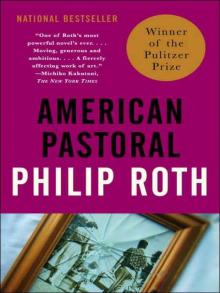 American Pastoral
American Pastoral The plot against America
The plot against America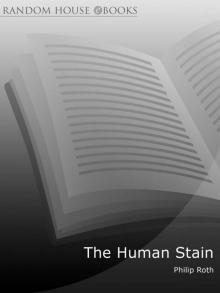 The Human Stain
The Human Stain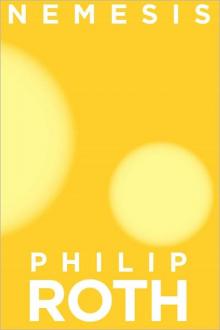 Nemesis n-4
Nemesis n-4 Sabbath’s Theater
Sabbath’s Theater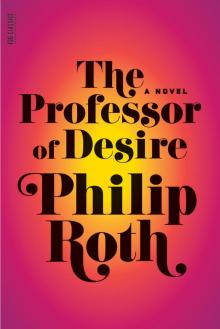 The Professor of Desire
The Professor of Desire Our Gang
Our Gang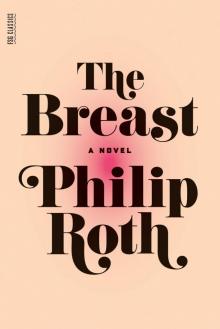 The Breast
The Breast Operation Shylock
Operation Shylock The Dying Animal
The Dying Animal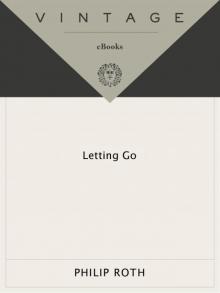 Letting Go
Letting Go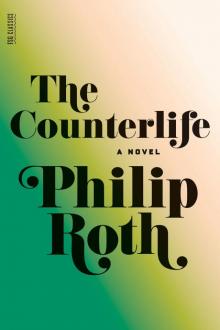 The Counterlife
The Counterlife Everyman
Everyman Nemesis
Nemesis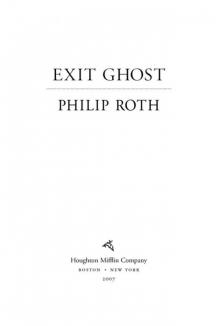 Exit Ghost
Exit Ghost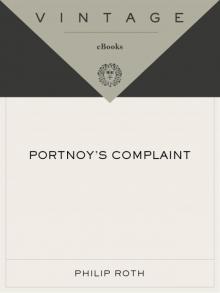 Portnoy's Complaint
Portnoy's Complaint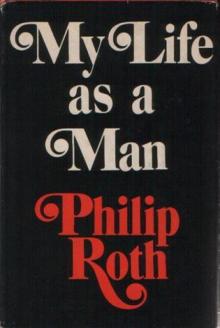 My Life as a Man
My Life as a Man I Married a Communist
I Married a Communist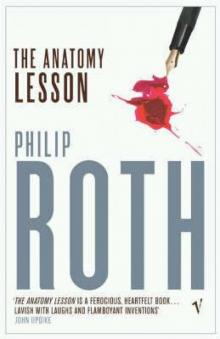 The Anatomy Lesson
The Anatomy Lesson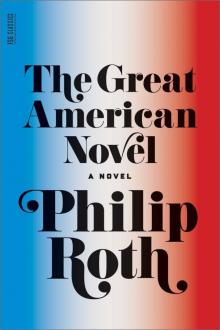 The Great American Novel
The Great American Novel Shop Talk
Shop Talk The Humbling
The Humbling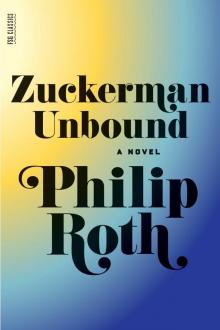 Zuckerman Unbound
Zuckerman Unbound When She Was Good
When She Was Good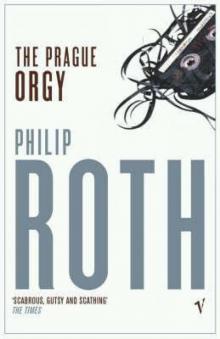 The Prague Orgy
The Prague Orgy American Pastoral (Nathan Zuckerman)
American Pastoral (Nathan Zuckerman) Goodbye, Columbus
Goodbye, Columbus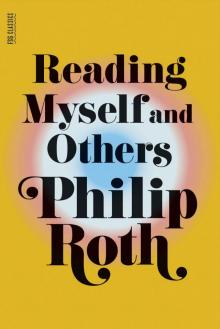 Reading Myself and Others
Reading Myself and Others